From a Banana to Bologna
Via Presentation, Poor Photography, a Cuddle in a Cup and a Slightly Salty Moral Tale
Dearest Gentle Reader,
I hope all is well with you and yours. I have been thinking of writing to you all week around food presentation and I have the best Italian tale I’m bursting to share with you too. Why presentation you say, what does that have to do with delicious food? Surely, as demonstrated by various dubiously lit, slightly blurry Instagram photos, presentation is not what you, Rachel, first think of when serving a meal. You would be mostly right, but in defence of my photography, I live in a north facing terraced house so finding patches of good natural light is challenging. I also definitely think food serving temperature is more important than presentation or photography.
However, there is a part of me that cares and would love to share gorgeous glossy photos that look as good as the food tastes (see better attempts below). I’ll even admit that I originally chose white china plates because I have the possibly mistaken belief that all dishes look nice against on them, unless they are gorgeous cheeses and autumn fruits when I think they look best against wood or slate (pre Instagram, so no judgement please).
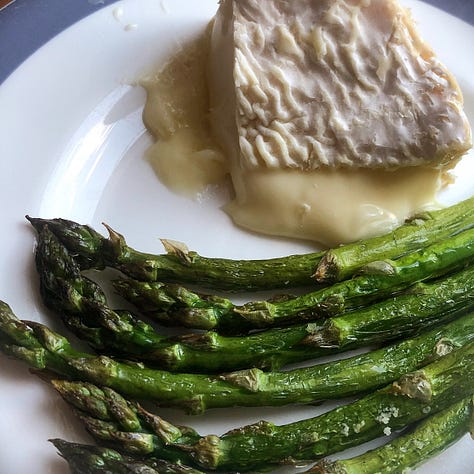
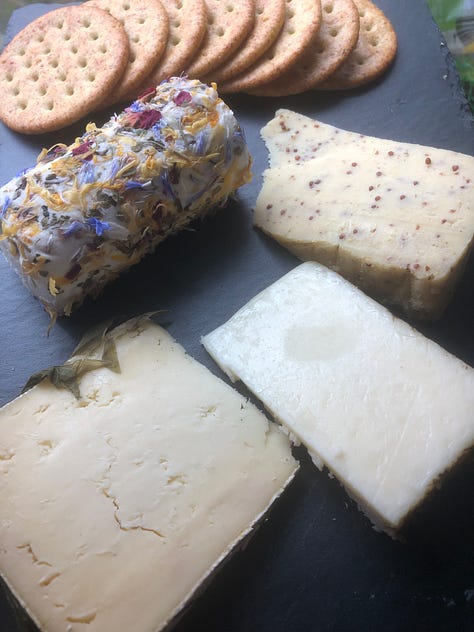
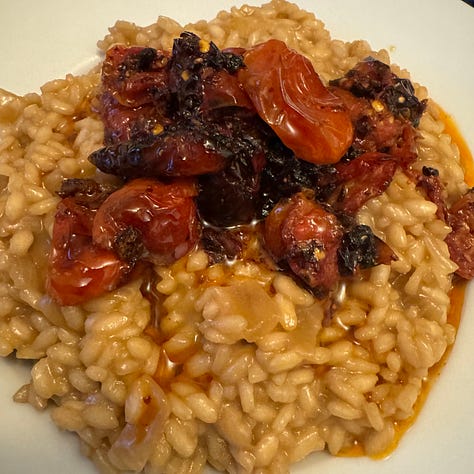
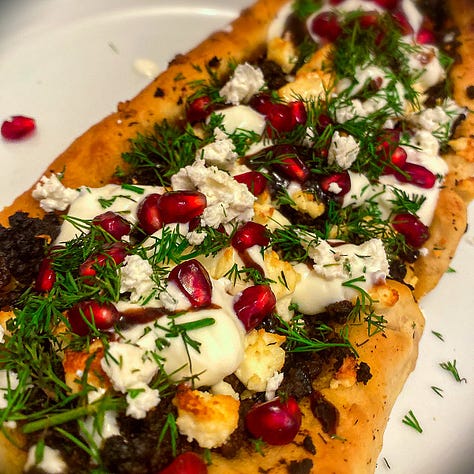
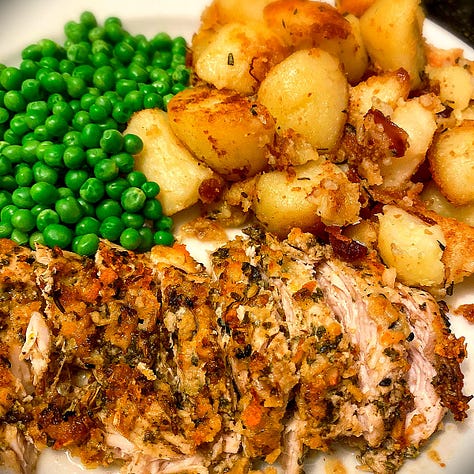
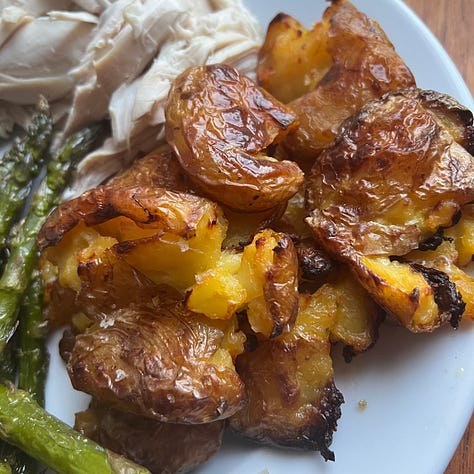
Considering this, I have been surprised how insistent these thoughts about presentation have been to the point where I couldn’t help but write to you about them. If I try to pin it down, I think the seed of these thoughts must have been a small act of consideration from a near stranger. Without boring you with the specifics of my breakfast situation, essentially it all came down to a beautifully sliced banana and a jaunty fresh sprig of mint. It wasn’t much in the big scheme of things but it made me feel really appreciated and taken care of in a strange sort of way. Like a hug in the form of breakfast garnishes, if you can class a banana as a garnish.
When I stay with my Mum, she always brings you a cup of tea when she makes her first one and leaves it outside your bedroom door in a china mug with a pretty plate of biscuits. There is no need to get up properly, you can bring it back to your bed and settle down with a book with biscuits to hand (it wouldn’t work here, the cat would lap the tea and lick the cow off the malted milk biscuit before you had a chance to whisk them away), its just a lovely thing. She does it for everyone who stays with her and somehow having that first tea and biscuit presented that way feels a little like the metaphorical hug I got from my special banana & mint presentation. You feel as though someone cares enough to do something just a little bit extra and that can be a rare thing when you are an adult and you are usually the person taking care of other people.
It made me think that maybe good presentation isn’t necessarily all about instagram or trying to impress but can sometimes just be a way of showing that you care, that you are worth taking the time over. It even works if you are just cooking for one. I just hadn’t realised that that is what I’m doing when I eat alone. I make sure it looks good, in the right bowl or on the right plate even if I’m just decanting from packaging. I spend time choosing the right vessel for my drink, not necessarily the correct one, just the one that feels best. I’m reminding myself that I’m worth taking time and effort over even if it just to make my own dip for my oven chips.
I also think that things automatically taste better when served in the way that suits them best, think hot chips in paper eaten with a wooden chip fork at the seaside or delicious delicacies in a bento box in a park or a doorstep sandwich wrapped in greaseproof up a mountain with tea in a thermos or a gorgeous tiny tower of Indian dishes in the form of a complete meal stacked in tiffin tins. The perfect cup of tea in your favourite mug, an ice cold vodka martini in a slightly severe martini glass or a glass of something very chilled and sparkling in a perfectly shaped delicate Champagne flute.
However they still need to be good tasty example of their kind, a lovely glass might help but if those bubbles really aren’t to your taste, the beauty in the design of the glass means nothing. I work with someone who cannot bear tasting wooden cutlery and those perfect chips would be completely wasted on him if he couldn’t have a less picturesque eating utensil. I suppose we all have to really decide what is of most value to us, whether that is flavour, stylish presentation or simply the love that comes with the food. I suspect these things are context dependent and we shouldn’t put ourselves in a position where are forced to choose one over the others.
That is advice the King in our story should perhaps have considered before his hasty actions caused all sorts of havoc. Let’s see if you agree:
In a time long ago and even longer ago than that there was once a king who ruled over a kingdom somewhere between sunrise and sunset. It was quite a small kingdom and when the king went up to the roof of his palace and took a look round he could see to the ends of it in every direction. But as it was all his own, he was very proud of it, and often wondered how it would get along without him because he didn’t have a son to inherit. He did however have three daughters, he could have split the kingdom between them or even waited until they got married and chosen the son in law he liked best to inherit but because he had far too much time on his hands he came up with a cunning plan.
He was very proud of this plan and told it to the queen who was less than impressed although she took care not to show it as he was a very stubborn man and the more she objected the more he would dig his heels in.
His plan was to give his kingdom to the daughter who loved him the most. This probably isn’t the best way to pick a ruler, you’d think knowing something about ruling would be more important but kings always think they know best. He wasn’t a bad king, just a vain one.
Anyway back to our three princesses, they had all been blessed by fairies at their birth as is traditional but the queen had had the sense to chat with the fairies first so their gifts were more useful than many. They all possessed wit, charm, health and courage and luckily because the queen had been very careful to invite all the fairies they did not receive any curses.
The king waited for the evening of the next full moon to carry out his plan and as they all sat down to a delicious meal of the kings favourite dishes: tiny cheese & prosciutto stuffed pasta dumplings in a rich clear broth with clouds of grated Parmesan, platters of mortadella & yet more prosciutto, rich pasties of quail, pigeon & pork, stuffed eggs with cheese, a Tart from Lavagna, a Romanian tart, Beef wrapped cottechino sausage and finally pork loin roasted in milk. There were wines from the palace vineyard and baskets of bread, the best sort with a chewy salty crust and a soft air-filled pillowy middle.
When everyone had dined and drunk their fill, the king cleared his throat and silence fell upon the room (it’s a gift all kings have) and announced with a great deal of self importance that he had a question for each of his daughters. They were all a little shocked but as they had been nicely brought up they gave their father their full attention.
‘First Zosima, how much do you love me?’
‘Father. You are very dear to me."
"How dear?" Zosima who did love her father but was suddenly stuck for words and glanced down at the table. Inspired she quickly responded with something close to father’s heart
"As dear as bread."
The king gave a little snort, but said nothing more, for he was greatly pleased with her answer. She must love me the most of all; for bread is the most essential of all foods. She means, therefore, that she loves me so much she could not live without me."
‘Now Zabina, how much do you love me?’
‘Father. You are very dear to me."
"How dear?" Now Zabina had had a bit longer to think so she responded with something else she knew her father loved.
"As dear as wine."
The king mumbled something to himself, but he was obviously delighted. "That is a good answer too," thought the king to himself. "It is true she does not seem to love me quite so much as the eldest; but still, one can’t live without wine, so there is not much difference."
‘Now Zizola, how much do you love me?’
‘Father. You are very dear to me."
"How dear?" Zizola responded knowing her father’s love of food and knowing what makes food so tasty said
"As dear as salt!"
By now the king had forgotten this was supposed to be about inheritance as his vanity had gotten the better of him. Hearing the response, the king was furious. He thought “she only loves me as much as the commonest thing that comes to the table. It’s as if she doesn't love me at all.”
"As dear as salt? Salt? You ungrateful madam! Out of my sight! I never want to lay eyes on you again!" And he ordered her taken out into the forest and left there to survive as best she could without everything he provided if she was so ungrateful.
The queen, who doted on her, heard the order, and racked her brains for a way to save her. In the royal palace was a large silver candlestick big enough for Zizola to get inside its base, so the queen concealed her there.
"Take this candlestick out and sell it," she said to her most trusted servant.
"When anyone inquires how much you're asking for it, if they are poor people, say a fortune; but if they are wealthy or of noble birth say he can have it for pennies , and make sure he gets it."
The queen kissed her daughter goodbye, giving her much parting advice about how to behave, along with a store of figs, cheese, chocolate, and pasties. (All the important food groups)
The servant carried the door sized candlestick to the town square, and to all those who wanted to know its price but whose looks he didn't like, he quoted a ridiculous amount. At long last the son of The neighbouring king happened by, examined the candlestick, then asked its price. The servant told him a preposterously low figure, the prince was a little suspicious that the servant had stolen the candlestick but he really liked it so he paid and had the candlestick carried to his palace. It was placed 'in the dining room, and everybody who came to dinner marveled at it.
The prince went to parties every evening and as he was considerate & wanted no one waiting up for him at home, the servants set out his supper and went off to bed.
Zizola had long since eaten the food the queen had provided and was starving so when she was sure everyone had left the room, she jumped out of the candlestick, ate up everything on the table, and returned to the candlestick. The prince came home, found nothing out for him to eat, rang every bell in the house, and gave
the servants a severe telling off. He might be considerate but he did get grumpy when he was hungry. They swore they had set his supper out for him and that the dog or cat must have eaten it.
"If it happens again, I'm dismissing everyone of you," stated the prince. He then ordered another supper, ate, and went off to bed. Next evening, although everything was locked up and the room checked beforehand for the palace dogs and cats the same thing occurred. For a while it looked as if the prince would bring down the house with all his shouting. Then he said, "We'll just see what happens tomorrow night."
When tomorrow night came, what do you think he did? He was very suspicious by this stage and determined to know what was happening. He hid under the table, which was covered by a cloth that came all the way to the floor. The servants set the table, putting out all the different dishes, then shooed the dogs and cats out and locked the door behind them. No sooner was everyone gone than the candlestick opened and out stepped lovely but hungry Zizola. She went to the table and ate up everything without caution as she was starving. Out jumped the prince and grabbed her by the arm. She tried to get away, but he held her tight., demanding an explanation.
Zizola knew the only way out was to tell him her whole story from beginning to end. The prince was so impressed with her courage and cleverness as well as her love of good food that he fell for her, head over heels. As in the best tales he asked her to be his bride. She, sensible girl that she was and bearing in mind her mother’s advice insisted that they should get to know each other better first. There’s no point jumping out of the frying pan into the fire and she wanted to make sure the prince’s handsome face was not hiding a wicked soul.
The prince was a little taken aback but agreed to this sensible idea.
“I think I have a plan” he said “but you’ll have to get back in the candlestick for one more night”
In the morning he ordered the candlestick brought to his room he said that it was so beautiful he wanted it near him at night. The next thing he did was have his meals sent to him with double size portions as he was suddenly much hungrier than normal. They brought him coffee and pastries, then a hot breakfast, then lunch, then dinner, every meal with double servings. The minute they put the dishes down and left the room he locked the door, invited Zizola out, and the two of them ate together with great enthusiasm. They talked for hours, and the prince’s goodness shone out through every word. They even found that they shared a taste for food and on finding out that they shared the same favourite dish - baked figs with cheese, walnuts & honey, Zizola told the prince that she would be his bride.
The queen meanwhile, who now had to take her meals in the dining room by herself, began to feel neglected. "What on earth could my son have against me not to dine with me any more? Have I done anything to him?"
Again and again he asked her to be patient, that he needed a little time to himself. Then the day Zizola agreed to be his wife he announced, "I am going to get married."
"And who is the bride?" asked the queen, cheered by the news.
The prince replied, "I am going to marry the candlestick!"
"Oh, goodness, my son has lost his mind!" said the queen, putting her hands over her eyes. He was serious, though. His mother tried to get him to see reason, reminding him of what people would say, but he wouldn't move an inch: he ordered all wedding arrangements completed in a week.
On the happy day, a long line of carriages left the palace. In the first one rode the prince, accompanied by the candlestick. They reached the church, and the prince had the candlestick carried up to the altar. At exactly the right moment the candlestick opened, and out stepped Zizola in her gold brocaded dress, with rivers of gems adorning her person and sparkling all over. The whole church erupted in shouts of happiness. After the wedding they returned to the palace, where the queen insisting on hearing their whole story. Being a very cunning lady, like Zizola’s mother she said, "Leave everything to me, and I'll teach that father of yours a lesson."
So they had the wedding banquet and invited all the kings in the vicinity, including Zizola's father. For him, the queen had a the same dinner as everyone else prepared separately, without a grain of salt in any of the dishes.
All the guests were informed the bride wasn't feeling well and couldn't attend the banquet. They began eating; but the king who got the tasteless dumplings in broth started grumbling to himself. "That cook forgot to salt the soup." What could he do but leave it. This was repeated with every dish he tasted: stuffed eggs, quail pasties, sausages, spinach tarts, all came to him just as saltless as the soup.
The king put down his fork "Why aren't you eating, Majesty? Isn't it good?"
"Of course, of course. It's delicious!"
"Well, why don't you eat?"
"Uh, uh, I don't feel too well all of a sudden."
He tried putting a forkful of his favourite roasted loin of pork into his mouth, and he chewed and chewed it like a goat but no matter how much he chewed, the meat would not go down.
Then he recalled what his daughter had told him, that he was as dear as salt to her. Overcome with remorse which in all honesty he had been bottling up since he had foolishly thrown her out as he thought to fend for herself, he burst into tears, thinking that she would not have survived in the wild woods . "Woe is me, what wrong have I done!"
The queen wanted to know what was the matter, and he told her all about Zizola. At that, the queen rose and summoned the little bride. Again and again her father embraced her; he couldn't help weeping and asking what she was doing there, as though she had risen from the dead. When Zizola saw how distressed he was for his thoughtless actions she forgave him although she did make him promise to divide the kingdom between her sisters now she stood in no need of it herself.
They sent for her clever mother too who became thick as thieves with her new mother-in-law, they renewed the festivities with a party every day, and I do believe everyone is there to this day and still eating, drinking and dancing.
I hope you enjoyed this tale, known as Dear as Salt, as much as I did. I adapted it from a tale told to Carolina Coronedi-Berti in Bologna in the province of Emilia Romagna. It was translated by Maria Roalfe Cox in her book about the 345 variants of Cinderella. It also appears in Italo Calvino’s Italian folktales. Calvino’s version placed a lot of emphasis on the jealousy of the heroine’s sisters which doesn’t appear in the earlier versions of the tale so I felt justified in keeping it out of my version.
The change in emphasis however is an interesting thing to explore from a gender perspective. I find it fascinating that emphasis on jealousy between the sisters due to their looks did not appear in the original telling by a woman, in the transcribing of dialect by a woman, or in the translation by a woman but then appears in the interpretation by a man. It’s almost certainly just a storytelling trick to add tension to the tale but it does make me ponder.
I was however charmed by the fact that allegedly the reason that Italo Calvino chose this variant when there at least three other versions of this folktale in Italy, is that in the Bolognese dialect the verb amoûr is used in the sense of taste, as well in the more traditional sense of love (How much do you love me = Quanto amoûr mi vuoi) so there is a culinary double meaning to the theme of the story.
I must confess that the description of the historic Bolognese feast is all my own as well as the shared love of baked figs and cheese between the lovers. I have absolutely no regrets or shame for either creation.
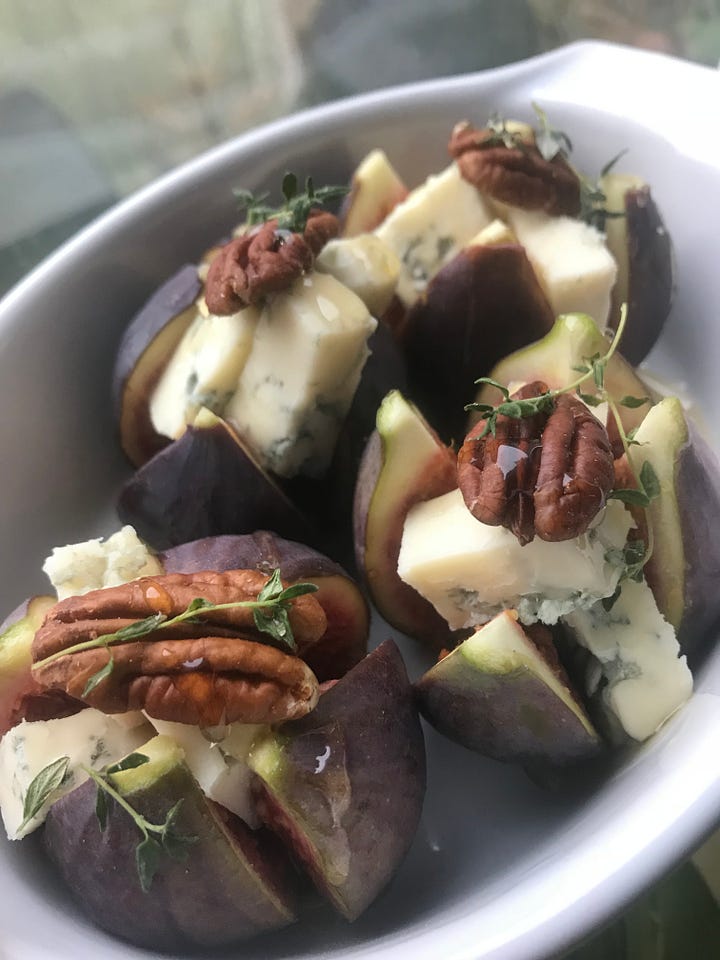
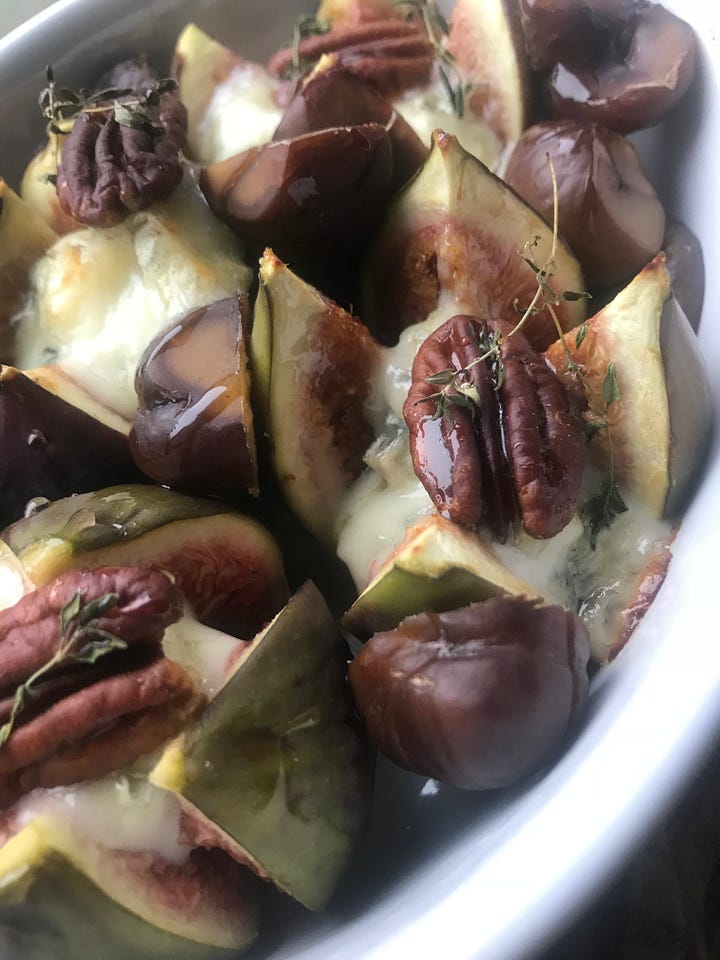
I’m very happy to discuss any thoughts you may have on the tale or on food presentation so please put them in the comments or I might even start a chat if I can remember how.
So with that, Gentle Reader, I must bring this letter to a close. Please don’t hesitate to get in touch via the comments or via any of my social media profiles/my website . If you have enjoyed this and would like to read further such nonsense and have not yet subscribed, please don’t hesitate to subscribe for free at the button below. You’d be very welcome and it would be a joy to write to you.
P.S Online cover image credit: Photo by Rumman Amin on Unsplash




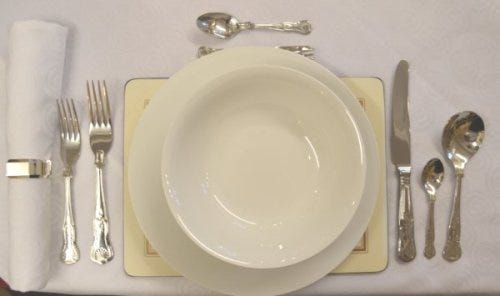
A lovely story with some excellent foodiness. Now I want figs baked with cheese...
Who doesn't love a good fairytale? My father was born in Romania and my mother in southern Austria so I grew up with "old world" parents... and those delightfully scary German fairytales. My mother's house was over 500 years old and I treasured the summers I was fortunate enough to spend there. The mountain village had about 50 residents. My aunt (like everyone there) raised almost all their food. Huge garden! She even had a smoking kitchen (die schwartze kuche) where my grandmother smoked everyones sausages and meats. The outhouse was at the bottom of a long stairway, the animals lived under the house to help keep the house warm. There was a stream out back and a village laundry room was created by harnessing the power of the rushing water. People bathed in the mountain stream and my mother said everyone had a designated area where they hid a bar of soap when they went to wash. My aunt cooked on a wood stove that had many drawers to which she kept adding wood chips. She would conjure up the most perfect and fancy tortes! When she served a smorgasbord of meat, cheese and pickled veggies she would curl the butter. I remember thinking as a kid how fancy it was being there, even when in so many other ways it was remote and primitive. The eye eats...so presentation is important, but it doesn't have to be excessive. Even a sprinkle of chives can add that pop....that delights our senses. Thank you! Figs are almost ready to pick!